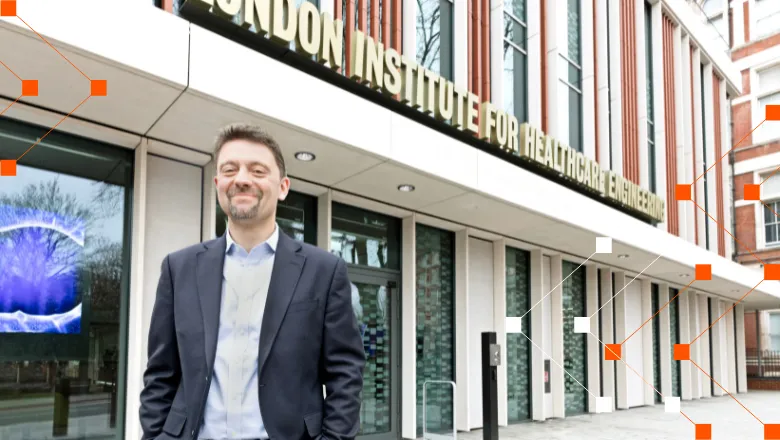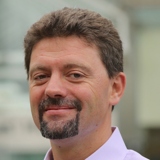17 April 2024
In Conversation with Professor Sebastien Ourselin
Professor Sebastien Ourselin is the Head of the School of Biomedical Engineering & Imaging Sciences, and the Director of the recently launched London Institute for Healthcare Engineering (LIHE). We spoke with him about his vision for LIHE, its unique value within the MedTech sector and how it supports King's Vision 2029.

Hi Seb, thank you for taking the time to talk to us. Could you tell us a bit about yourself and what you do at King’s?
I am a Professor of Healthcare Engineering at King's. My day-to-day job is as the Head of School of Biomedical Engineering & Imaging Sciences, which is part of the Faculty of Life Sciences & Medicine. While this role focuses on management and administration, my background as a researcher is in Digital Health and image-guided surgery, which I do my best to stay active in. I am an engineer by training and a computer scientist.
What was your original vision for LIHE and how did it come about?
I've been working on medical devices for as long as I can remember. As an academic, it became clear to me that it is very hard to develop these devices in a vacuum, without the environment in which they will be deployed. I saw that we had a choice - we could build these devices on a case-by-case basis or we could think of how to solve the problem once and for all.
LIHE came to me as a solution to try to solve this at scale, well beyond one person or one academic. I realised that if you want to bring a device into clinical reality and create a positive impact for patients, you need to get industry partners, the healthcare system and patients themselves engaged very early on in the process. In the MedTech sector, most of the innovation is delivered by smaller start-ups or university spinouts, which are companies whose commercialisation journey originates from research done in university. Meanwhile, translation at scale is achieved by a few large companies with the resources to do so. I believe that bringing both sides of this equation together is the key to creating positive impact, and LIHE is the all-encompassing framework that can make this possible.

LIHE is unique within the UK MedTech sector. Can you expand on what makes it different?
If you look at what makes up LIHE and split it up into different components- the journey a novel innovation makes from bench to bedside to boardroom- all of these are already done elsewhere, but separately. This makes taking a medical device from idea to market an extremely complex process. What makes LIHE unique is that we are bringing it all together in one place and at the heart of a hospital. Innovators and experts will form a team working together to ensure innovations can move at pace.
And of course, LIHE is only the visible tip of the iceberg. The institute is part of a rich, collaborative landscape that forms the St Thomas’ MedTech Hub. LIHE is only unique in its ability to deliver a difference to MedTech because of the people, the patients, the facilities and the public that make this possible, making it a true public-private partnership that includes universities, industry partners and the NHS.
Whom do you want to engage with LIHE, within and beyond King's?
LIHE is going to be a great force for King's to make an impact, but hopefully, it's also going to be a great enabler for the rest of the UK. Importantly, and we believe uniquely in academia, LIHE is an open ecosystem to MedTech stakeholders from outside of King’s. We want to engage with any companies in the UK working on medical devices- we can directly support startups, and we can exchange knowledge with corporates, increasing the speed of innovation from both sides.
First and foremost, we want to engage with parties across the NHS, as this is the healthcare system we hope to bring our technologies to. The translation journey of a medical device cannot happen in isolation, so we want to engage with policymakers, patients and the public too, and eventually hope to deliver LIHE’s goals internationally, so we have quite a long list there!
King's is known for its healthcare research. How does LIHE's ecosystem support this mission?
I think LIHE is a fantastic catalyst for the King's Vision 2029 because it brings together all the elements we need to change the healthcare space. For King’s, we are creating a pipeline of innovation, starting from our specialised MSc in MedTech Innovation and Entrepreneurship, to world-class Doctoral research, Venture Building programmes, and extensive clinical translation capabilities with our clinical partners.
At its essence, LIHE is about multidisciplinarity within the STEM sector, but also multidisciplinarity at large. LIHE has links with law, ethicists, regulators, policymakers, industry partners and more- we are concerned not just with the making of medical devices, but the commercial side of this process too, along with the uptake of said devices in a hospital setting. Will they be accepted by patients? Can they demonstrate adequate efficacy and safety while doing so? All these considerations make it a complex landscape which can be so thrilling on one hand, but also quite daunting on the other!
And finally, we want to do all of this with value-based healthcare that can change the economics of the system we work in. Technological innovations can create positive financial impact in our healthcare system, ultimately promoting sustainable financial savings within it.
What excites you most about LIHE?
The model that we are implementing at LIHE in a physical space has already been tried and tested successfully at King’s, with the recent announcements from our spin-outs of an exit of Innersight Labs to KARL STORZ, and of a very significant funding round for Hypervision Surgical. With LIHE, we are most excited to recreate this model to make a difference to patients, but now at scale.
We can be excited about a new piece of technology, but if this technology doesn't reach the patients that need it, it makes no difference. So fundamentally, there is only one thing we should be judged on, which is how many lives are touched by technology coming from LIHE.

Visit lihe.org.uk to learn more.

